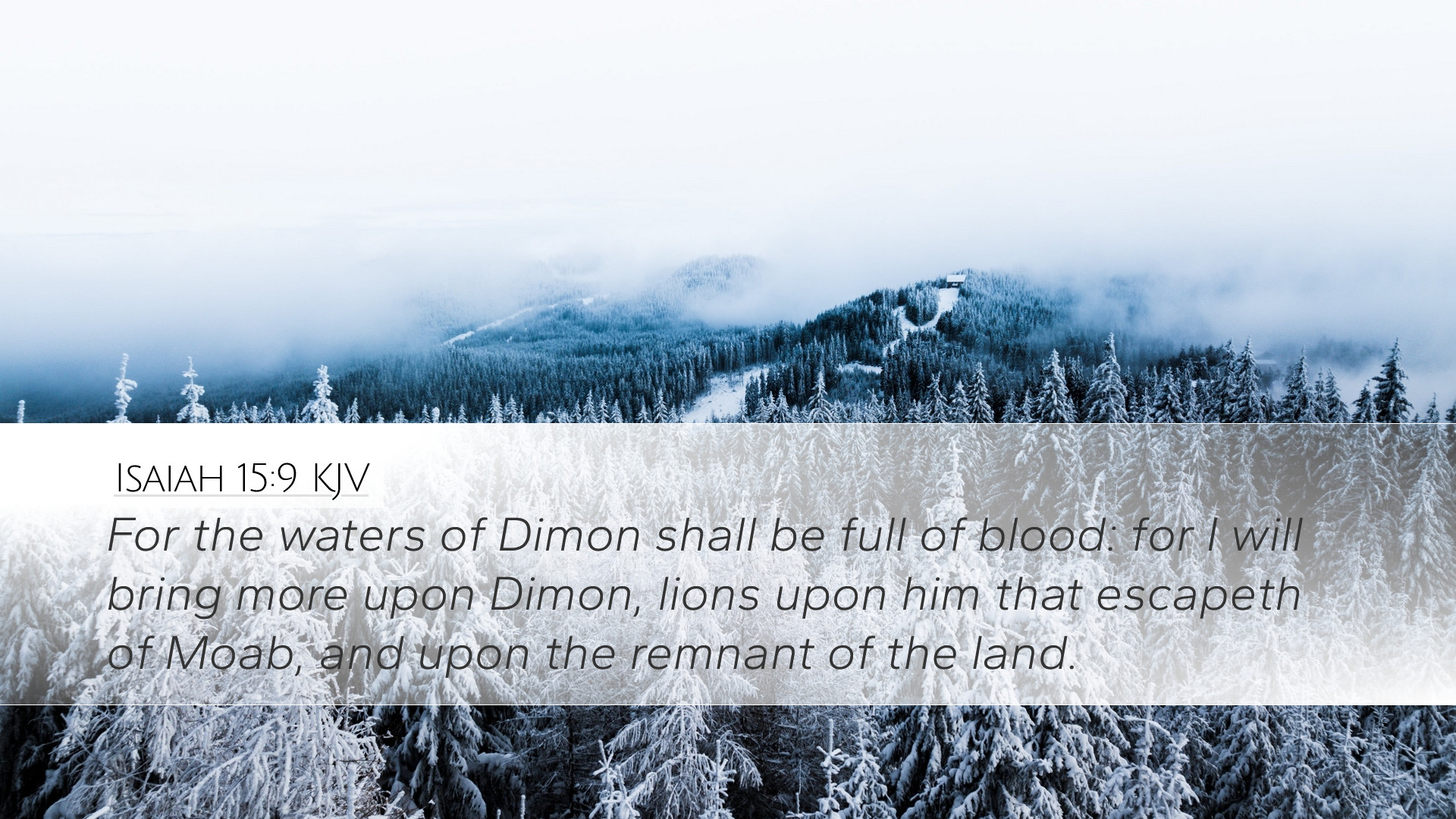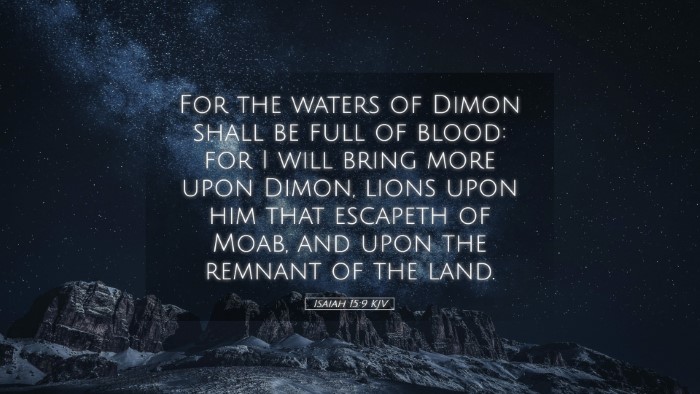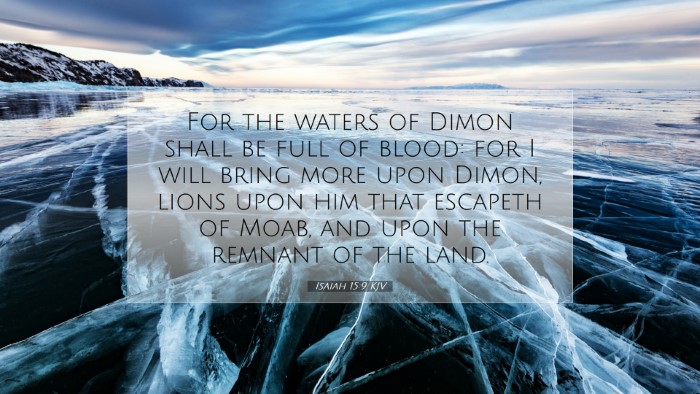Bible Commentary on Isaiah 15:9
Verse in Context: Isaiah 15:9 states, "For the waters of Nimrim shall be desolate: for the hay is withered, the grass faileth, there is no green thing." This verse reflects the aftermath of judgment against Moab, a neighboring nation often at odds with Israel. In the broader context of Isaiah 15, the prophet delivers a lamentation over Moab, highlighting impending destruction and divine judgment.
Contextual Overview
This prophecy is directed towards Moab, a land southeast of Israel, known for its rich agricultural lands and vineyards. The Assyrian conquest has led to desolation, and Isaiah’s lament underscores the complete destruction of what once thrived. The focus here is on the 'waters of Nimrim,' which likely refers to marshy areas that were once fertile but are now dry, signifying a profound loss.
Insights from Public Domain Commentaries
1. Matthew Henry's Commentary
Matthew Henry reflects on the stark imagery presented in this verse. He notes that the reference to the waters drying up serves as a metaphor for loss and despair. The 'hay' and 'grass' symbolize the provision that God typically blesses His people with, and their failure signifies desolation in Moab's situation. Henry emphasizes that such devastation is a direct consequence of sin against God, reminding the reader that turning away from divine precepts leads to destruction.
- Sinasters of Desolation: The vivid description of withered hay and failing grass serves to illustrate not just agricultural failure but the spiritual drought that follows. Henry connects this degeneracy to the broader theme of judgment—when nations turn from their Creator, they face inevitable consequences.
- Call to Repentance: While Henry acknowledges the judgment, he also sees this as an opportunity for reflection and repentance, suggesting that even amidst desolation, God's grace is still extended for those who turn back to Him.
2. Albert Barnes' Notes
Albert Barnes contextualizes this verse within the overarching theme of prophecy against Moab. He elaborates on the significance of Nimrim, noting its historical and geographical importance as a locality characterized by water sources essential to agriculture.
- Geographical Significance: Barnes points out that the desolation of the waters denotes not only physical scarcity but also spiritual barrenness that accompany national ruin. This reflects the nature of divine judgment that impacts both the land and the people.
- Impending Judgment: He notes that this destruction serves as a prelude to further calamities that will befall Moab, indicative of God’s hand in the course of nations. This event serves as a reminder that God's sovereignty extends over all territories, and His judgment is impartial.
3. Adam Clarke's Commentary
Adam Clarke delves into the linguistic aspects and historical context of the verse. Clarke notes that the term 'Nimrim' may have connections to the base word for 'rushing' or 'continuous flow,' which denotes the previous abundance that has now turned into scarcity.
- Linguistic Interpretation: Clarke emphasizes the transformation from abundance to barrenness, suggesting that God’s blessing once poured out on Moab is now withdrawn due to their rebellion. This journey from plenty to want serves as a powerful narrative of loss and consequence.
- Spiritual Insight: Clarke also offers a theological insight that mirrors the wider biblical theme: God’s blessings are conditional upon obedience. This verse serves as a poignant reminder for both Israel and her neighbors of the expectations that come with God’s provisions.
Theological Reflections
This verse is rich with theological implications for understanding God’s justice and mercy in response to human sinfulness. The desolation of Moab functions as a microcosm of the broader biblical narrative regarding divine judgment and the consequences of straying from God’s path.
1. The Justice of God
The swift judgment portrayed in Isaiah 15:9 stands as a testimony to God’s justice. The imagery of desolation points to the reality that sin brings judgment. This reflection serves as a reminder to believers about the nature of God—while He is loving and merciful, He is also righteous and just.
2. The Call to Awareness
This verse invites readers—pastors, theologians, scholars—to reflect on the state of their own communities and nations. The desolation experienced by Moab can serve as a warned to modern societies about the repercussions of sin, guiding us to a more profound vigilance in our spiritual states.
3. Hope Amidst Judgment
While this passage captures the somber reality of judgment, it also opens avenues for hope. It echoes the truth that even in desolation, there is potential for renewal and repentance when one turns back to God, an essential theme in the scriptures that resounds throughout prophetic literature.
Concluding Thoughts
Isaiah 15:9, through its vivid imagery and profound implications, serves as a reflective point for understanding the serious consequences of sin and the hope found in repentance. Pastors, students, and scholars alike are called to engage with the text not just academically but with a heart of reflection and transformation.
Ultimately, this verse challenges us to consider the state of our spiritual landscapes, both personally and corporately, urging all to seek God’s sustaining grace in times of drought and desolation.


